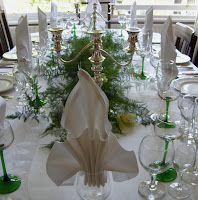Home Hospitality
The French writer J-A Brillat-Savarin once wrote that "to receive guests is to take charge of their happiness during the entire time they are under your roof." That’s quite a responsibility. I also think it’s a privilege. We “take charge” of someone’s happiness when they have trusted us with it.
The thought of guests arriving unannounced will fill some readers with terror. Perhaps you can’t bear the thought of people seeing your house untidy or think it disrespectful to receive guests into a home you haven’t cleaned. Making sure your home is clean and tidy is an important way to show respect for guests. Of course it is. When we visit people, though, we don’t look for an immaculate house, filled with the smell of lemon and spring flowers. We look for a warm welcome: open conversation, a 2-way sharing of news and a little refreshment. Unless the place stinks of putrefaction, I probably wouldn’t even notice, still less care, how clean the floor is or when the mirror was last polished. Save the cleaning for the days when your hospitality is pre-planned, and relax into the spontaneity of unexpected visits.
What should we do on those special days, then? Everything depends on your own tastes, interests and talents. You can’t take charge of someone’s happiness when you’re so far out of your own comfort zone that you’re no longer yourself. I love to cook, and I feel more relaxed in formal situations, so the best way for me to entertain is with a planned dinner. I can happily spend a day or two shopping, making ice-cream, baking pastries and laying out a beautiful table, but I hate the pressure my friends put on themselves to do the same when we visit. If informality is your thing, have the confidence to serve up a vast pot of vegetable curry with a sharing-platter of pakoras, dips and other goodies. If you hate cooking, buy in pizzas and set out a board game. Or host an impromptu gin festival by cutting up a selection of fruit, veg and herbs, buying in some posh tonic waters and telling everyone to bring a gin they think no-one else has tried.
There’s a lot to be said for “making your own entertainment.” Music has such power to bring people together. Think how many of your friends listen to several of the same bands as you? Throwing back the carpet, sticking on iTunes and having a dance can be very freeing. I once even had a go at basic flamenco at one party in a student house in Liverpool. My cousin plays guitar and lacks nothing in confidence. Family parties often involved him leading a singalong. His repertoire changed little in 40 years, but there are now four generations who know the family take on what passes for backing-vocals to “The Boxer” and who get a little glassy-eyed remembering my aunt’s, slightly tipsy, dance to “Jamaica Farewell.” For those who enjoy dressing up, there are various scripted murder-mystery kits on sale. You’d be surprised how well shy people respond to being someone else for an evening. Simple role-playing games like Werewolves can be fun, or you can organise a card school if you prefer a more focused style of game.
 |
| Dressed for murder! |
I’ll finish by coming back to my Mum. She once told me that there are two types of people: those who offer hospitality and those who wait for it to come to them. “Be one of the first, Paul,” she said. “They’re the happier ones.” Hospitality doesn’t have to be any more stressful than the pressure we put ourselves under to do something that’s not in our nature. Good hospitality is simply a matter of inviting people whose company we already enjoy, to share time with us, doing the things we like, in our own home.
This post is adapted from an article first published in The Yorkshire Times.






Comments
Post a Comment